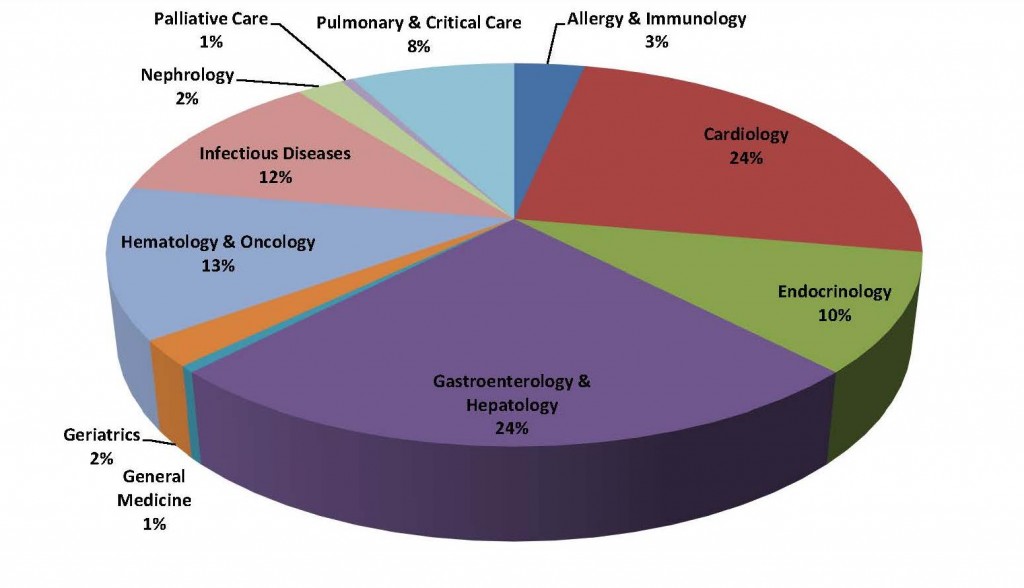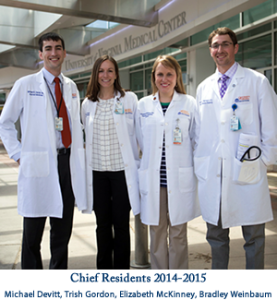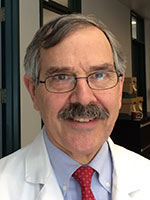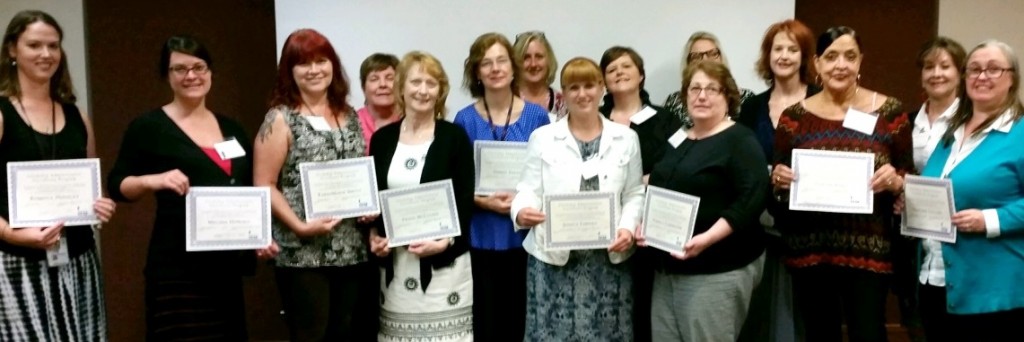Education
THE EDUCATIONAL MISSION:
Nurturing the Physicians and Researchers of Tomorrow
The educational mission of the Department of Medicine (DOM) is to develop and nurture the next generation of physicians, medical educators and clinical investigators who will help shape the future of medicine in this country and around the world.
The department plays an essential role in the School of Medicine’s education and training programs at all levels, with thousands of DOM faculty hours devoted to teaching and mentoring medical students, residents and fellows. In addition, many faculty members serve in leadership roles and on a variety of teaching and curriculum committees in the School of Medicine. They contribute to UVA’s Continuing Medical Education (CME) programs as well, providing content and leadership for many CME-sponsored courses and conferences.
EDUCATION LEADERSHIP
Department of Medicine Vice Chair for Education & Internal Medicine Residency Program Director:
Gerald R. Donowitz, MD
Residency Vice Program Director:
Brian Uthlaut, MD
Residency Associate Program Directors:
– Allison Lyons, MD
– Neeral Shah, MD
– Brian Uthlaut, MD
– Andrew Wolf, MD
- Medicine Clerkship
- Internal Medicine Residency Program
- Subspecialty Fellowships
- Education Administration
Medicine Clerkship
The Department of Medicine’s internal medicine clerkship is designed to provide medical students with a basic fund of knowledge about common clinical problems and disease states encountered in the practice of inpatient and outpatient internal medicine. They learn to apply that knowledge in a wide variety of settings, developing the analytical and clinical skills necessary for the practice of evidence-based, cost-effective medicine. They gain experience in the use of consultants, the coordination of ancillary healthcare services, and the critical assessment of medical information.
For the 2014–15 academic year, the medicine clerkship once again received a grade of “A” from the Mulholland Society, the UVA medical student organization that each year produces the Mulholland Clerkship Report. The medicine clerkship was also recognized with a Mulholland Society Departmental Teaching award, which honors superior teaching by a department’s faculty and housestaff; it is selected annually by third-year medical students and handed out at their graduation ceremony the following year.
During FY 2015, the UVA School of Medicine’s accreditation was renewed for an eight-year term — the longest available — by the Liaison Committee on Medical Education, an arm of the Association of American Medical Colleges and the American Medical Association. The successful accreditation review was due in part to the dedicated efforts of DOM’s clerkship director, Brian Wispelwey, MD, and clerkship administrator, Karen Ward.
Karen was honored in October 2014 with a “Clerkship Coordinator of the Year” award from the School of Medicine’s clerkship office; she also earned a “Clerkship Administrator” certification from the Central Group on Educational Affairs, part of the Association of American Medical Colleges (see sidebar below).
Internal Medicine Residency Program
The Department’s Internal Medicine Residency Program, under the leadership of Gerald R. Donowitz, MD, consistently attracts outstanding candidates from across the country. It provides a balance of hands-on patient care and cutting-edge research opportunities, with faculty who highly value their roles as mentors and teachers. The program is resident-centered and unequivocally resident-run — as evidenced by innovations such as the night float system and the current service structures designed and implemented by residents. The general aim of the program, which in academic year 2014–2015 had a total of 99 residents, is to guide physicians in developing their individual interests and strengths while building up their knowledge base and core clinical skills. The goal is to produce clinician educators and researchers of the highest caliber who practice evidence-based, cost-conscious medicine focused on patient care and safety. To this end, a variety of training tracks are offered:
- Categorical: The traditional track emphasizing training in general internal medicine, with a focus on subspecialty and hospital-based practice.
- Primary Care: Designed for individuals wanting a career in general internal medicine (in either academic or clinical practice). Primary care residents spend an increasing proportion of time over their three years in the ambulatory setting, designing elective experiences to meet their training needs and interests.
- Preliminary: A one-year program that allows individuals to gain a broad experience in internal medicine before continuing in other medical disciplines. Includes inpatient rotations on the general medicine services, medical intensive care unit, coronary care unit, hematology-oncology and digestive health.
- ABIM (American Board of Internal Medicine) Research Pathway: For individuals with extensive research interests and academic subspecialty career goals, this pathway consists of two years of training in the categorical track followed by one or more years of clinical training in a subspecialty and at least five years of research training. It is offered in the subspecialties of cardiovascular disease; endocrinology, diabetes and metabolism; infectious diseases; and nephrology.

UVA Internal Medicine Residency Program: Fellowship Match Results by Subspecialty, 2007 to 2014
Over the last five years, approximately 75 percent of residency graduates have gone on to subspecialty fellowships, while the remainder have pursued careers in general internal medicine. Of those, more than half are working as hospitalists; another 45 percent work in outpatient primary care settings.
An analysis of eight years of fellowship match data (2007–2014) for graduating internal medicine residents pursuing subspecialty fellowships reveals that the highest proportion chose gastroenterology and cardiology (24 percent each), followed by hematology-oncology (13 percent), infectious diseases (12 percent), endocrinology (10 percent) and pulmonary-critical care (8 percent), as shown in the pie chart at right.
For the 2015 match season, approximately 3,000 applications were received from the Electronic Residency Application Service (ERAS) and screened. It was a very successful match for the categorical, primary care and preliminary tracks, with a match cohort that had impressive scores and excellent geographic distribution.
 Chief residents for 2014–15 were Michael Devitt, MD; Trish Gordon, MD; Elizabeth McKinney, MD; and Bradley Weinbaum, MD. They did an excellent job and made outstanding contributions to the residency program.
Chief residents for 2014–15 were Michael Devitt, MD; Trish Gordon, MD; Elizabeth McKinney, MD; and Bradley Weinbaum, MD. They did an excellent job and made outstanding contributions to the residency program.
- Meet some UVA internal medicine residents:
- Match Day, March 2015
- Departing Housestaff, May 2015: Future Plans
- Awards from IM Residents to Attending Faculty and Fellows
Transition to 3+1 Scheduling & Restructuring of General Medicine Wards to Geographic Unit Model
During FY 2015, the reorganization of the resident training program continued with the implementation of a 3+1 scheduling model (three blocks of inpatient rotations alternating with a dedicated block in the outpatient setting). The changes are intended to maintain the quality of inpatient care and allow for greater continuity and more undistracted time for residents to care for patients in the outpatient setting. An important goal in transitioning to the new system was to maintain the values and characteristics that have distinguished UVA’s residency program in the past: resident-designed training, a one to one resident-intern inpatient team, a curriculum customized to the needs of each resident and maintenance of a healthy work/life balance.
The 3+1 scheduling plan was mapped out by a team that included the 2014–15 chief residents, Vice Chair for Education Gerald Donowitz, MD, key clinical faculty and education program administrators; it became operational at the beginning of FY 2015 (July 1, 2014).
At their Grand Rounds presentation on May 20 — “The Evolution of Medical Education at UVA: It’s Darwinian” — departing chief residents Drs. Devitt, Gordon, McKinney and Weinbaum provided an analysis of the new system after its first year in place: its advantages and disadvantages, possible changes in the structure of educational conferences and the implications of geographic units.
Based on that feedback, one change for the 2015–2016 academic year is the time for the residents’ one-hour morning report, which will take place from 11:30 a.m. to 12:30 p.m., instead of 8:00 a.m. to 9:00 a.m., as previously. The change will allow residents to get more work done early in the morning and allow greater attendance at the best teaching conference of the day.
In addition, plans are being made by the department to change the basic structure of its General Medicine wards to create geographic units, so that the majority of each medical team’s patients will be on a single ward. The goal is to enhance patient care by facilitating healthcare team communication and multidisciplinary interaction.
Subspecialty Fellowships
In the 2014–2015 academic year, 76 clinical fellows and 12 postdoctoral research fellows were enrolled in 15 Accreditation Council for Graduate Medical Education-accredited and five nonaccredited fellowship training programs, including:
- Allergy & Immunology
- Basic General Cardiology & Cardiovascular Disease
Advanced Cardiovascular fellowships in:- Cardiac Valve (nonaccredited)
- Cardiovascular Imaging (nonaccredited)
- Clinical Cardiac Electrophysiology
- Heart Failure & Transplant
- Interventional Cardiology
- Vascular Medicine (nonaccredited)
- Endocrinology, Diabetes & Metabolism
- Gastroenterology & Hepatology
- Geriatric Medicine
- Hematology and Oncology
- Stem Cell Transplant (nonaccredited)
- Hospice and Palliative Medicine
- Infectious Diseases
- Nephrology
- Transplant Hepatology (nonaccredited)
- Pulmonary Disease & Critical Care Medicine
- Rheumatology
Newly minted “Certified Clerkship Administrators”
Clerkship Conference Offers Opportunity for Professional Growth
Clerkship coordinators at UVA are essential to keeping medical students organized and on track as they rotate through different clinics and specialty areas during their third and fourth years — part of the hands-on clinical training process known as “clerkships.”
Karen Ward, the Department of Medicine’s coordinator for the Internal Medicine Clerkship (the largest clerkship program in the School of Medicine), was instrumental — along with colleagues from Pediatrics, Ob-Gyn and Family Medicine — in organizing the Mid-Atlantic Clerkship Coordinators Conference, held at UVA in September 2014, as well as a follow-up meeting in September 2015, also held at UVA. These conferences gave participants the opportunity to earn their Certified Clerkship Administrator (CCA) credential; they were attended by all of UVA’s clerkship coordinators, as well as some from outside UVA. All the UVA attendees earned their CCA!
The credential is issued by the Association of American Medical Colleges (AAMC).
Planning for a new subspecialty fellowship program in the Division of Cardiovascular Medicine — an advanced fellowship in cardiac valve — was spearheaded by Scott Lim, MD, during FY 2015, and will accept its first fellows for the 2016–2017 academic year. Dr. Lim will serve as director for the fellowship program.
During FY 2015, DOM fellows and residents produced an impressive 80 publications in peer-reviewed journals. The annual Carey-Marshall-Thorner Scholars and Research Day, held each May, provides a forum for fellows, residents and faculty mentors to present their research, cultivate collaborative relationships and celebrate the breadth and depth of scholarly exploration in the department. Associated events include Grand Rounds, oral presentations by trainees and new faculty members, a poster session open to all, an awards ceremony and reception. More about the conference, including photos and a list of award winners, can be found here.
Profiles of two Department of Medicine fellows:
Education Administration
The DOM Education central administration team, directed by Joy Hilton, includes GME compliance manager Terry Bennett and a staff of 12 education program coordinators assigned to the Medicine clerkship, internal medicine residency program, and the fellowship programs of DOM’s 10 divisions. During FY 2015, the DOM Education team said goodbye to two long-time staff members — Elaine Day, GME compliance manager, and Kathy Crozier, fellowship coordinator for the Division of Infectious Diseases — hired new employees and redefined roles for others. As part of its ongoing engagement project, the team met monthly to share best practices and stay informed about developments related to medical education. Team members identified areas of personal interest or expertise for which they agreed to mentor other coordinators. The DOM Education team as a unit had the third-highest engagement scores in the School of Medicine, according to the annual UVA Employee Engagement Survey conducted by the Gallup Inc.
In May 2015, the team traveled to Richmond for a workshop at Virginia Commonwealth University for medical education coordinators statewide, with opportunities for networking on topics such as milestones and evaluations, updates to ERAS, and the Next Accreditation System (NAS) of the Accreditation Council for Graduate Medical Education (ACGME). At ACGME’s annual conference (held in February 2015 in San Diego), Joy Hilton and Terry Bennett conducted a workshop on an assessment tool, “Milestones for Program Administrators,” developed by the DOM education team in 2014. It was also featured in HCPro’s Residency Program Alert publication.


